TORONTO – A study by researchers at the University of Illinois suggests that hurricanes with feminine-sounding names are likely to cause more significant damage than their male counterparts — not because they’re more destructive, but because they’re not believed to be as threatening.

The study, led by Kiju Jung and co-author Sharon Shavitt, examined death rates of hurricanes in the United States over the past 60 years. Severe hurricanes with feminine names resulted in a higher death toll, they found. One of the reasons, their study suggests, is that a storm with a feminine name is seen as less dangerous than those with a masculine name. This perception may lead to people taking fewer precautions against the impending storm.
READ MORE: Reality check–How accurate are NOAA’s hurricane forecasts?
Using data from the National Oceanic and Atmospheric Administration (NOAA), Shavitt and her colleagues looked at hurricane fatalities that occurred in the continental United States since 1950. They then took the names and asked a set of panellists to rate how masculine or feminine each of those storm names were. The panellists were unaware of the study, or that the names were associated with hurricanes. (The study did not take into account Hurricane Katrina in 2005, or Hurricane Audrey in 1957 because they were much deadlier than the typical storm.)
“We found for severe storms, where taking protective action would have the greatest potential to save your life, the more feminine the name of the storm, more people are killed,” Shavitt told Global News. “And that was over and above the characteristics of the storm itself.
“Now it appears that these gender stereotypes are also influencing the way we respond to life-threatening situations that are completely non-social and it has deadly consequences.”
Names of hurricanes alternate between male and female. The process of naming hurricanes began in 1953 by the National Hurricane Center. Initially all the hurricanes were given female names, but in 1979 the tradition of alternating between male and female names was adopted for the Atlantic (it was adopted in 1978 for the Pacific storms). The list is now maintained by the World Meteorological Organization.

There are six name lists which alternate each year, regardless of whether or not each name has been used (names beginning with Q, U, X, Y, and Z are not on the lists). Names of highly deadly or destructive storms are retired with a new name replacing it.
READ MORE: Hurricane season forecasts tied to El Nino
Shavitt, a behavioural scientist, is a professor of marketing at the College of Business at the University of Illinois.
“We’re interested in how people evaluate things and how they make decisions,” she said. “What this study tells us is that gender biases affect the way we judge all kinds of things, including non-human things,” We’ve known for some time that implicit biases about gender routinely affect the way that actual men and women are judged in our culture…we know that men are judged to be stronger, more competent, less warm than women.”
- Trudeau tight-lipped on potential U.S. TikTok ban as key bill passes
- Canadian man dies during Texas Ironman event. Her widow wants answers as to why
- Hundreds mourn 16-year-old Halifax homicide victim: ‘The youth are feeling it’
- On the ‘frontline’: Toronto-area residents hiring security firms to fight auto theft
The study appears in the Proceedings of the National Academy of Sciences on June 2.
Shoshana Magnet, an associate professor at the Institute of Women’s Studies at the University of Ottawa said that this type of gender representation exists in many forms.
“I think that patriarchy –- a system which forces women into subordinate positions to men — continues to structure representations of men and women,” she said in an email to Global News. “Culture – in many forms, but including in the mass media -– continues to represent women using sexist tropes.”
The University of Illinois study took into consideration each storm’s intensity, such as minimum central pressure and damage that it did. For storm names before 1953, when NOAA began alternating between male and female names, the panellists were asked to rate on a scale of how feminine each name was, even though both names were female.
“What our analysis suggested is that if you had the same storm, and it was named Charlie, which is a rather masculine name, if you renamed it Eloise, it would kill nearly three times as many people,” Shavitt said.
“If you wanted to be even more extreme, if we went with a highly, highly masculine name, the most masculine you could imagine — in our dataset, the most masculine name was Ivan, which just about anchored the scale of masculinity — our model suggests that such a storm would kill about 11 people. But if you renamed it with the most feminine name possible, like maybe Belle…it would kill about 5 times more people.”
Though the numbers seem small, Shavitt pointed out that for severe storms, the consequences are much more significant.
“Policymakers and meteorologists are consistently trying to get out the word about the anticipating severity of the storm, but then that name is an extra layer of information which is compeltely irrelevant, but people are using it anyway.”
Shavitt hopes that the study will make meteorologists reconsider how they report severe storms, such as not using pronouns such as “her” and “him” when communicating about natural hazards.
“We hope that it will encourage policymakers to examine this closely and consider what the implications will be for hurricane naming,” Shavitt said.


Comments